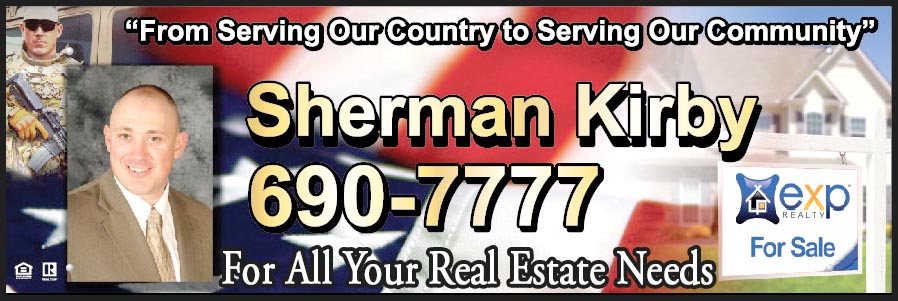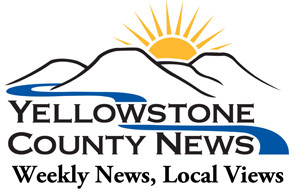MT US Senate Candidates begin forum at the Elks Lodge in Billings on Tuesday April 24th. From left to right, Troy Downing, Matt Rosendale, Russell Fagg, and Albert Olszewski. (Photo by Yellowstone County News)
Originally published in the 4/27/18 print edition of Yellowstone County News.
BILLINGS — The conversation got a little bit contentious during the GOP US Senate Forum on Tuesday evening at the Elks Club in Billings, where the candidates weighed in on a wide range of issues from CSKT to the Veteran’s Administration, from tariffs to health care. As might be expected, however, there was far more agreement among the candidates than disagreement.
The primary point they all wanted to make was who would most likely be able to defeat incumbent Democrat, U.S. Sen. Jon Tester. Having deep roots in the state was an emphasis of candidates Dr. Al Olszewski and Judge Russell Fagg, in contrast to relative newcomers, candidates Troy Downing and Matt Rosendale. Rosendale is a former Montana legislator and current State Auditor. Downing, who lives in Big Sky, is a businessman and veteran.
Downing claimed that the post should be filled by someone with combat experience, since Congress is charged with the responsibility of making decisions about going to war and those decisions should be made by someone who understands what that really means. Rosendale pointed to his record of reducing regulations and spending as qualifications to continue representing Montanans. He was the only state official to refuse a pay increase, during a budget shortfall. “That’s what a leader does,” he said.
With Fagg and Rosendale having been identified in recent polls as the frontrunners, Fagg initiated some sparing with Rosendale regarding a tour of the state by Rosendale, that has the appearance of being funded by public dollars.
“Why didn’t you do the tour last year or next year?” challenged Fagg. Rosendale rebutted that the tour is part of his job as State Auditor to connect investors with entrepreneurs. It is being funded not at taxpayers’ expense, but through the Investor’s Protection Fund, which “the industry provides with no tax dollars.”
“Sounds like a slush fund to me,” quipped Fagg, a former District Court judge and state legislator from Billings.
Fagg also challenged Rosendale about a 2014 statement he made in support of transferring federal lands to the state. Fagg said he has since “flip-flopped” on that position. Rosendale responded, “I listened to the people of Montana…they said they wanted to retain the ownership of federal lands.”
In another bout, Fagg pointed out that in three years, Rosendale has run for five offices, and people have asked him, “Why don’t you just stay where you are at?” He said when asked at a Bozeman forum whether he was troubled that if elected, a Democrat would appoint a Democrat to replace him as auditor, Rosendale said it really doesn’t matter who the auditor is. Fagg asked, “Then why did you ask the people for their vote?”
These are issues that will be used against Rosendale by Democrats in a campaign against Tester, said Fagg.
Olszewski, an orthopedic surgeon from Kalispell, veteran and current Montana senator, made the point that in the only independent poll by a Montana firm, he held a lead with 53 percent support. Calling himself “the Cinderella story,” Olszewski said he is the only “grassroots” candidate.
You dance with the one who brought you, said Olszewski, in dedicating himself to Montana voters. He related how he rejected a request to make promises to outside interests in exchange for money for the primary. “I went to Washington, D.C., and I was offered money for the primary if I would just sign on the line and vouch my loyalty to them,” he said, adding, “I said ‘no’… I am running only on Montana money, your money.”
“If you want somebody to stand up to Mitch McConnell,” said Olszewski, then he is the candidate. He said Mitch McConnell is “the problem” and he would tell McConnell “you gotta go.”
On April 12, one day after he announced his campaign, “I got a talking to” by Montana’s House Speaker Austin Knudsen, said Olszewski. He was told, said Olszewski, “You can’t be running in this race… They don’t know you. They haven’t vetted you, and you haven’t been to this charm school.”
Olszewski said he responded by asking, “Did you tell them that this seat belongs to Montana?”
Among the candidates, one of the sharpest points of differences regards the CSKT (Confederated Salish and Kootenai Tribes) Water Compact.
While Fagg said that he does not support the legislation in Congress that Tester submitted because it costs too much, “I love the process… Montana is so lucky to have that process.” He pointed out that in the end, the legislation that passed the Montana State Legislature, after being worked on for 10 years, had the support of the Attorney General, the Chamber of Commerce, The Stock Growers Association and the Grain Growers Association.
“It was the best we could do,” he said, and without that agreement, the issue would “drag on for decades and cost millions and millions of dollars… at the end of the day, the result would likely be worse.”
“No. No and no,” responded Olszewski, saying that the water right owners in Western Montana were not at the table, “we were on the table.” The 2015 legislation was an agreement with Democratic governors and the tribe that divided up Montana water rights and gave them to a third party. He predicted that the agreement would lead to even more losses of water rights in the future on other river drainages in Montana and other states.
“It could be a lot better, not a lot worse,” said Olszewski, adding, “Russ, I want my day in court.”
Olszewski went on to say that the state Legislature did not follow procedure and “It was an unconstitutional taking of our water from Western Montana … You might as well rip out the page of the Montana Constitution that says the water belongs to the people of Montana for our enjoyment,” declared Olszewski.
Rosendale agreed that the process was one that was not in keeping with house rules and that he opposes the U.S. Congress ratifying the legislation.
Should Facebook and Google be regulated by the government?
Downing said, “It is an anti-trust issue and not a regulatory issue.” He said that he believes in the power of the free market and is opposed to any more regulations.
“You can distill my philosophy,” he said, “to ‘I don’t like people telling me what to do.’”
The other candidates agreed that the issue is an anti-trust issue, with Olszewski saying it is time to break them up.
The issue of tariffs was also one of general agreement, as was the need to move health care more into the private sector as it pertains to the replacement of ObamaCare and as a solution for the Veteran’s Administration.
Downing said about the VA, “You talk about a big, bloated government program that is just a big disaster….we need to use the private sector for solving problems in the VA.”
Rosendale related that in 2016, in rating VA hospitals, Montana’s hospital got a rating of two stars of a possible five. The next year, an update of the rating dropped Montana to a one star.
“The worst part was the spokesman at the hospital said, ‘Just because it went down it doesn’t mean we have a problem.’ There’s the problem,” he said, “They won’t admit they have a problem.”
Said Olszewski, who was at one time a physician for the VA, the entire bureaucracy needs “a culture change.”


